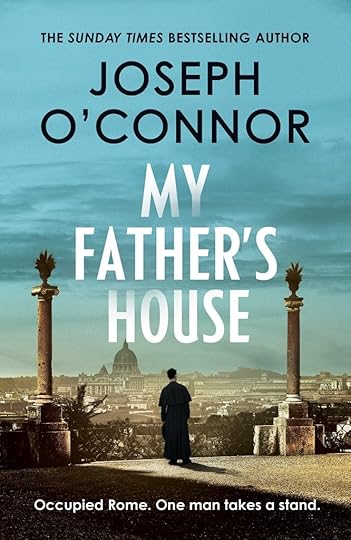My Father’s House Rome Escape Line Trilogy #1 by Joseph O’Connor
From the best-selling author of Star of the Sea, a WWII-era “great escape” novel set in the Vatican.
September 1943: German forces occupy Rome. Gestapo boss Obersturmbannführer Paul Hauptmann rules with terror. Hunger is widespread. Rumors fester. The war’s outcome is far from certain.
Diplomats, refugees, and escaped Allied prisoners flee for protection into Vatican City, at one fifth of a square mile the world’s smallest state, a neutral, independent country within Rome. A small band of unlikely friends led by a courageous Irish priest is drawn into deadly danger as they seek to help those seeking refuge.
Book 1 in the Rome Escape Line Trilogy, My Father’s House is a powerful, heartbreaking literary thriller based on the true story of Monsignor Hugh O’Flaherty, who risked his life to smuggle thousands of Jews and escaped Allied prisoners out of Italy under the nose of his Nazi nemesis. A deadly high-stakes battle of wits ensues in this astonishing, unforgettable story of love, faith and sacrifice, exploring what it means to be truly human in the most extreme circumstances.

My Review
I don’t often read stories about the Second World War, especially about Nazi occupation, concentration camps and the fate of the Jews. Being of Jewish extraction – my mother had to escape Vienna in 1938 – it can become too personal. So I only read one every few months, otherwise I feel choked with emotion.
My Father’s House takes place in occupied Rome and follows the same story as the film The Scarlet and the Black, starring Gregory Peck as Irish Catholic Priest Monsignor Hugh O’Flaherty. It’s a true story, set mainly in the Vatican, where a small group of eight friends came together to help Jews and escaped Allied prisoners out of Italy and the risk of being killed or sent to the concentration camps by the Nazis. They called themselves the ‘Choir’ and they did actually sing and play instruments to act as cover for their true reason for meeting.
The year is 1943 and Hugh’s main enemy is Gestapo boss Obersturmbannführer Paul Hauptmann (actually called Henry Kappler, but I am told that the author could not bring himself to call him by his real name in the book). Some of the things he did are almost impossible to believe any man could be capable of. One of these was the Ardeatine massacre, a mass killing of 335 civilians and political prisoners carried out in Rome on 24 March 1944 by German occupation troops as a reprisal for the Via Rasella attack in central Rome against the SS Police Regiment Bozen the previous day. Kappler was one of the main instigators of the massacre.
The bravery of the Choir is unparalleled, and together they saved thousands from certain death and torture. A modest man, Monsignor Hugh always played down his part in the proceedings, but he was undoubtedly a true hero. He actually survived the war, as did the other members of the Choir, and lived until 1963, when he died at the age of 65. He was invited to appear on the TV programme This Is Your Life, but was too ill to be the main guest, but did appear briefly at the end as a guest of Sam Derry, one of the Choir members.
My Father’s House is not an easy read, for many of us it will be an emotional experience, but it is an important one. We must never forget the bravery of these people, without whom many more would have died and we might not be afforded the freedoms we have come to expect today.
Many thanks to The Pigeonhole, the author, and my fellow Pigeons for making this such an enjoyable read.
About the Author
Joseph O’Connor was born in Dublin. His books include Cowboys and Indians, Inishowen, Star of the Sea (American Library Association Award, Irish Post Award for Fiction, France’s Prix Millepages, Italy’s Premio Acerbi, Prix Madeleine Zepter for European novel of the year), Redemption Falls, Ghost Light (Dublin One City One Book Novel 2011) and Shadowplay (Irish Book Awards Novel of the Year, Costa Novel of the Year shortlist). His fiction has been translated into forty languages. He received the 2012 Irish PEN Award for Outstanding Contribution to Literature and in 2014 he was appointed Frank McCourt Professor of Creative Writing at the University of Limerick.




